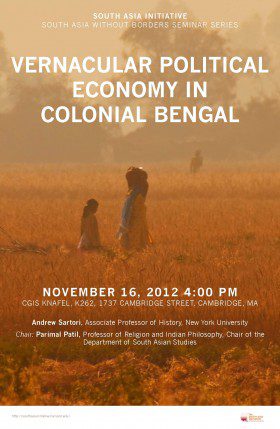South Asia Without Borders Seminar Series
WHEN
Fri, Nov 16, 2012 from 04:00pm — 05:30pm, ET
{
"name":"South Asia Without Borders Seminar Series",
"description":"Vernacular Political Economy in Colonial Bengal Andrew Sartori, Associate Professor of History, New York University Chair: Parimal Patil, Professor of Religion and Indian Philosophy, Chair of the Department of South Asian Studies Bengali agrarian politics of the late colonial period turned to a very great extent on debates over property. To make sense of the emergence […]",
"startDate":"2012-11-16",
"endDate":"2012-11-16",
"startTime":"16:00",
"endTime":"17:30",
"location":"",
"label":"Add to Calendar",
"options":[
"Apple",
"Google",
"iCal",
"Microsoft365",
"MicrosoftTeams",
"Outlook.com",
"Yahoo"
],
"timeZone":"America/New_York",
"inline":true,
"listStyle":"dropdown-static",
"iCalFileName":"Mittal-Event-2012-11-16"
}
 Vernacular Political Economy in Colonial Bengal
Vernacular Political Economy in Colonial Bengal
Andrew Sartori, Associate Professor of History, New York University
Chair: Parimal Patil, Professor of Religion and Indian Philosophy, Chair of the Department of South Asian Studies
Bengali agrarian politics of the late colonial period turned to a very great extent on debates over property. To make sense of the emergence of this kind of agrarian politics (which could be variously articulated in terms of the aspiration to “Muslim emancipation,” “cultivator rights” and “tenant rights”) requires an account of the process by which political-economic concepts were vernacularized in the Bengali countryside in the later nineteenth century.
 Vernacular Political Economy in Colonial Bengal
Vernacular Political Economy in Colonial Bengal